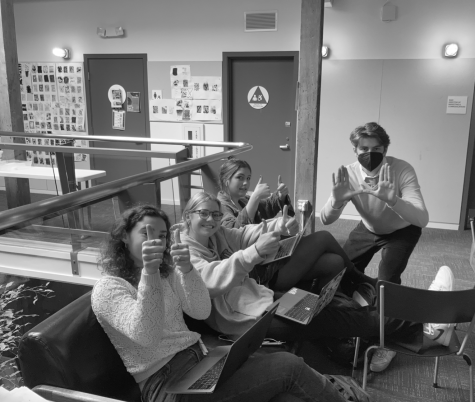Opinion: Is senior spring the epitome of privilege?
As the days get longer and the San Francisco weather refuses to get warmer, senior spring has arrived. While ninth, 10th, and 11th graders have completed their course selections for the upcoming school year and are looking toward summer opportunities to add to their resume, the twelfth grade is soaking up their last few months at Urban. Particularly in upperclassmen classes, there can be a strong divide in mindset between juniors and seniors. Juniors are starting to think about the upcoming college application process, whilst seniors are well aware that spring grades are typically not considered by colleges.
The seniors’ last term at Urban has been coined ‘senior spring’. This is due to the fact that it is in the spring term, and most colleges don’t look at spring grades. Thus many seniors use the trimester as an opportunity to explore themselves and their academic classes, without the pressure of needing good grades. The effects of relieving this pressure can most prevalently be seen through class participation.
There has been some critique of senior spring. Some find it disrespectful and privileged for students to take school lightly, given the high tuition fees and opportunities for the deep learning that Urban offers. However, I strongly disagree with this sentiment and would even go as far as to say that senior spring has been the only term in my time at Urban that has felt fully aligned with Urban’s mission statement that states “learning is an active, joyful process of discovery.”
In response to how senior spring affects her learning, Nicola McDermott ’23, a junior in a senior-dominated history class, said, “I think [my experience with senior-dominated classes] cultivates a love for Urban that might not be as present in another class.” This experience falls in line with what I have felt in my own senior-dominated classes. Participation has no longer become an anxiety-inducing practice that could make or break my grade. Instead, it occurs whenever I am genuinely curious about what is being discussed.
This newfound curiosity that is tied to my own authentic interest rather than a pressing need to bump up my participation grade seems to carry over to other peers. McDermott said, “I think [I’m] able to extract interesting things from the conversations that we have in class, but there’s also just [a] contrasting light-hearted energy that’s a reflection of senior spring and of the way that seniors are feeling right now.” I agree with Mcdermott, rather than condemning seniors for the lighthearted curiosity they bring to spring classes, I challenge us to question why the eleven other terms at Urban are plagued by excruciating levels of pressure that often threaten to diminish the joy of learning.
In past years, when my dad asked me what I was looking forward to, I would always jokingly respond with ‘graduation’. But only now that graduation is closer than ever, I understand the value that comes with learning for the sake of learning, and with prioritizing a healthy social life, and not prioritizing an assignment over sleep. Others may call this slacking off, but to me, I am getting the most value out of Urban’s steep tuition. I arrive at classes fully rested, have time to laugh with friends in tutorials and finish my homework looking forward to the next school day. In past terms, I would go to bed worried that there was still more studying I could’ve crammed into my night, and already dreading the next night of homework.
Though I look forward to graduation, I also lament the many terms that I spent so caught up in individual assignments that I forgot to take a breath. I was so caught up in the moment-to-moment that I had little time to truly see what Urban offers, outside of just rubrics and final evaluations.
